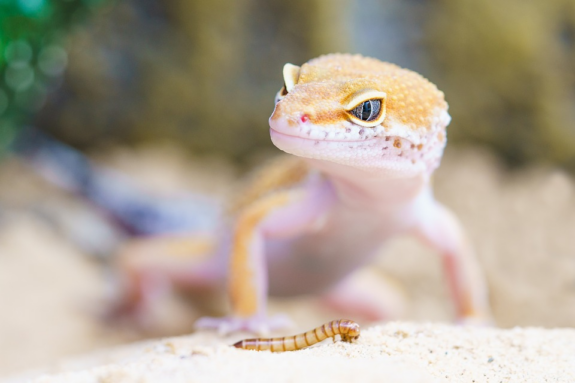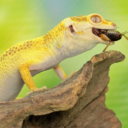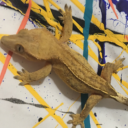A leopard gecko can stop eating many different reasons. Sometimes it’s changes in the weather, reproduction cycles, food preferences, even new habitats can affect your gecko’s eating routine. A common issue for new leopard gecko keepers is bringing a gecko into a new home. A new habitat and enclosure can cause a gecko a fair amount of stress. This stress will cause your gecko to eat less for a short period. Other changes, some out of your control, can cause your gecko to change his or her eating habits.
The most common reasons for a gecko to decrease his appetite are easy to check with a thermometer and a quick equipment check. Some geckos though will experience a brumation period or other cycles unbeknownst to the pet owner. When this happens it can leave you feeling puzzled. As long as you are regularly monitoring your gecko’s health, offering calcium supplements, and maintaining the proper environmental conditions then your gecko will grow to be a healthy adult leopard gecko and thrive far past sexual maturity.

What do I do if my gecko refuses to eat?
If your gecko refuses to eat, do not panic! As my grandfather used to say, “panic kills.” Some geckos are just picky eaters! Check to make sure your tank doesn’t have an improper temperature anywhere. Check your humidity levels and your humid hide. Make sure the heat mat or other supplemental heat source is in proper working condition. Temperature issues are the most common cause of gecko appetite loss. If you’re certain the temperatures are where they need to be then you can move on to other environmental parameters. It may be a good idea to get a food scale and start tracking your gecko’s mass and the mass of its meals.
How long can my leopard gecko go without eating?
Leopard geckos can go quite a long time without eating a meal. But just because they can endure such treatment does not mean you should try to put them through this. Possible reasons for loss of appetite can be extensive so it’s best to feed your gecko regularly, when it is hungry. Offer fresh water always in a shallow dish. Female geckos may eat more or less during certain parts of the breeding season. A baby leopard gecko will generally not eat until after shedding his first old skin. Food items will be rejected until the shed is complete and both juvenile and adult leopard geckos can and will eat their own shed skin. This is completely normal. A gecko’s enclosure should be free from any uneaten live insects between feedings.
How do I force my leopard gecko to eat?
If your veterinarian advises you to do assisted feeding for your gecko you will need a powdered insectivore diet, an appropriately sized syringe, rubber gloves and a lot of patience. The goal is to get your gecko to eat as much as a normal meal (you were using a food scale, right?) without causing more stress and harm than is necessary. Hopefully this sort of thing only needs to be done once or twice before your gecko makes a rebound as assisted feedings can be very stressful especially for a little guy like a baby gecko.
If you need to monitor your gecko’s diet extra closely, try using paper towels as a loose substrate. It will be easy to see any extra live prey, you can more easily monitor the floor temperature and the cold sides and warm side. Your moist hide can remain in the enclosure. Some issues like intestinal parasites or fecal impaction can cause your gecko’s belly to look full or even distended. These things can be ruled out by your veterinarian after you have determined that your gecko’s cage has the proper temperatures.

Will a leopard gecko starve itself?
A leopard won’t starve itself, per se. But they can stop eating for many stress-related reasons like a new environment. If you’re feeding your gecko something like wax worms as more than the occasional treat then your gecko may “starve itself” in protest if you switch to dubia roaches. Female leopard geckos may “starve themselves” if they are busy worrying about producing or laying eggs. The best way to keep tabs on your gecko and its appetite is to track its mass and the mass of its meals with a food scale. If your gecko loses a lot of weight, you will immediately notice. You will be able to discern trends over long periods of time.
What should I do if my leopard gecko won’t eat?
It’s a good idea to do a few different things when your gecko won’t eat. For starters, check your tank temperature, both the cool side and the hot side. Give your gecko a warm bath. Try to determine when he last pooped. Weigh him and begin to find alternative food options that you can offer him. The first signs of trouble can be just simply your gecko skipping a meal. Again, don’t panic, because a healthy gecko can skip many, many meals before it becomes a serious health issue.
How do I know if my leopard gecko is dying?
If your leopard gecko is extremely lethargic and unable to open his eyes then it is probably time to see a veterinarian. A dramatic lack of appetite will cause your gecko’s fat tail to shrink down in size and become quite thin. If you are starting to see your gecko’s hip bones protruding then he is likely underweight. Gecko’s can lose body weight during the winter months when they don’t eat as much and their digestive system slows down but a dramatic loss of weight will be visually obvious. Adult geckos have an appetite that is more affected by the time of year.
Metabolic bone disease is definitely something to be aware of when raising young geckos but generally is unrelated to appetite issues unless you’re dealing with terminal MBD. Rapid weight loss can be alarming for your gecko’s health. There is a good chance that your gecko is having issues getting to his heat pad or heat bulbs. A healthy diet is reliant on proper husbandry. The good news is that the potential reasons your gecko may not be eating are relatively easy to solve.

There can be many, many reasons your leopard gecko may stop eating. For instance, something as simple as leaving dead insects in your gecko’s tank. Or even new surroundings or an incomplete shed. All these things and more can cause your gecko to deviate from his normal eating regimen. Even fussy eaters will have some type of pattern to their natural feeding cycles.
Has your gecko ever chosen to skip a meal or more? How did you deal with it? Do you keep records your gecko’s health and weight? What works for you? What doesn’t? Leave a comment or reply down below to let us know!



